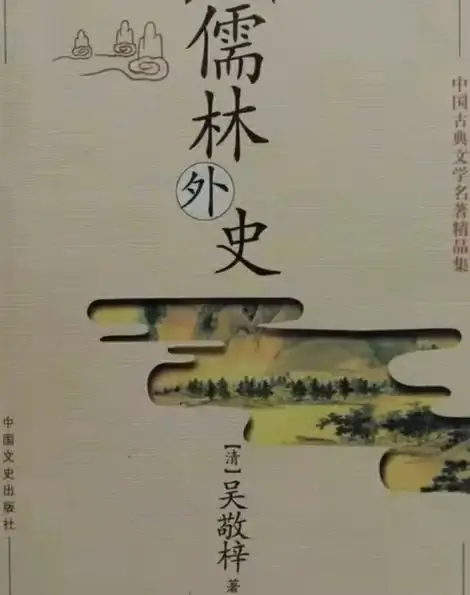Holy objects in ancient Chinese satirical novels
Overview
Chinese Name: 儒林外史
English Name: The Unofficial History of the Scholars
Other Name: Rulin waishi, The Scholars
Author: Wu Jingzi 吴敬梓
Originally Published: In 1750 (Qing Dynasty 清朝)
Genre: Novel
Brief Introduction of The Unofficial History of the Scholars
The Unofficial History of the Scholars 儒林外史 is the holy objects in ancient Chinese satirical novels written by Wu Jingzi 吴敬梓 in the Qing Dynasty 清朝. It is a full-length novel. The Unofficial History of the Scholars represents the peak of satirical novels in ancient China and creates an example of evaluating real life directly by fiction.
The book began to be written in the early Ming Dynasty 明初, lasted about 248 years, through the rise and fall of a dynasty. Fifty-six chapters of the book depict the different expressions of “fame and wealth” by various people in realism. On the one hand, it really revealed the process and reason of human nature being corroded, and deeply criticized and ridiculed the corruption of local officials, the malpractice of imperial examinations and the hypocrisy of ethical codes. On the one hand, it enthusiastically praises the guardian of human nature made by a few characters in the way of insisting on self, thus consign the author’s ideal.
It describes some Confucian scholars who were poisoned by the eight-point imperial examination system, and reflects the corruption of the secular atmosphere at that time. Such as Zhou Jin 周进, Fan Jin 范进 for the examination of the people exhausted the energy of life, to the beard gray has not been admitted to the scholar. Although their lives were extremely difficult, they never forgot the imperial examinations.

Zhou Jin passed an examination room, touched the bitterness and pain of life, sad to die. His luck changed when he took the exam with the help of some small businessmen and won the sympathy of the examiners. When he passed the examination, those who had scorned and scorned him came to flatter him and praise him as the most learned man.

Another example was Fan Jin, whose family was so poor that he had nothing to eat before he was elected. When he learned that he had passed the exam, he was so happy and crazy that he became mad. But a slap from his father-in-law, Hu Tuhu 胡屠户, brought him to his senses. At this time, the local people looked at him with new eyes and gave him houses and property. Fan Jin’s life immediately changed dramatically.
There are also examples of corrupt officials, such as Tang Feng 汤奉 and Wang Hui 王惠. Once a poor scholar becomes an official, he will soon become a corrupt official. There is a typical fan of eight strands. Such as Ma Jing 马静 and Lu Bianxiu鲁编修. Countless feudal literati diligently studied the eight-part essay. The Scholars not only expose and satirize the ugly scholars, but also affirm and praise the positive characters. Wang Mian 王冕 and Du Shaoqing 杜少卿 are the typical representatives of those intellectuals who do not crave fame and fortune.

The use of vernacular language in the novel has become proficient, the characterization of characters is also quite in-depth and delicate, especially the use of superb irony, which makes the book become a masterpiece of classical Chinese satire.
Author of The Unofficial History of the Scholars
Wu Jingzi (1701-1754), a writer of the Qing Dynasty, was born in Quanjiao 全椒, Anhui province 安徽省, originally from Wenzhou 温州, Zhejiang Province 浙江省.

Born into a bureaucrat’s family, Wu jingzi was smart at an early age. His father Wu Linqi 吴霖起 was very strict with his education, Wu Jingzi had to study the Four Books and Five Classics 四书五经, eight-part essay all day long. Wu jingzi was tired of eight-part essay, but in those days, the only way out was to seek fame through scientific examinations. Young Wu Jingzi also had the idea of taking the imperial examination as a way out.
In 1717, Wu Jingzi began to read novels, operas and other works extensively, and his personality of pursuing freedom was developed to a certain extent.
Wu Linqi was honest and did not like the evil feudal officialdom, so he resigned and went home. After Wu Linqi resigned, he fell ill. Since then, Wu Jingzi’s life has undergone fundamental changes. His money was looted and his wife died in a family feud. His outlook on life and society changed.
In 1736, due to illness, he could not take the imperial examination, and later began to write The Unofficial History of the Scholars.
Wu Jingzi’s old age life was very poor and he had to rely on selling articles and friends to help life. He died of illness and poverty in 1754.
Excerpts From The Unofficial History of the Scholars
人逢喜事精神爽。
People are especially happy when they meet happy things.
清官难断家务事。
Family troubles are also difficult for impartial officials to deal with.
书中自有黄金屋,书中自有颜如玉。
It was a great way out of life at that time to gain fame by reading. After obtaining fame, one could get wealth and beauty.
Evaluation of The Unofficial History of the Scholars
“The Unofficial History of the Scholars” uphold the heart of public, criticizing the current evils. Its writing is rigorous and humorous. It is the disclosure of all sorts of discordant, absurd phenomena that have violated human and common sense. There are few such satirical books to follow.
Lu Xun 鲁迅
An artistic feature of the book is the sketches and silhouettes of characters. The Unofficial History of the Scholars is a novel with an ever-changing protagonist.
If a young man who is going to write a novel wants to find something from our old novels that can help him “develop his art”, then I recommend “The Unofficial History of the Scholars”.








